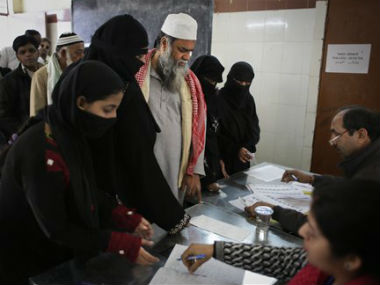While the number of Muslims candidates in the 2015 Delhi Assembly Election was much lower than 2013 (only 68 Muslim candidates stood this time compared to 108 two years ago), for the community the choice appears to have been simple this year: Vote for the Aam Aadmi Party. An earlier report by IANS had noted the contrast between the AAP and BJP when it came to Muslims candidates. AAP gave tickets to five Muslims, down from six in 2013, which is admittedly not a great number given that AAP had fielded a total of 70 candidates. However AAP’s five Muslim candidates is much higher than the BJ,P which fielded only one Muslim - Shakeel Anjum Dehlavi, who was formerly with the AAP. In 2013 too, the BJP had fielded only one Muslim candidate. Post the election, it would appear that Muslims have gone with the AAP and Kejriwal wave. According to
this Times of India report, “if there was one thing that Delhi’s Muslims were sure of, it was that they would not vote for the BJP, read Narendra Modi.” It’s not just the BJP that has failed to impress Muslims, but also the traditional Congress party, which has seen Muslims as their strongest supporters. The report notes that AAP has emerged the favourite amongst Muslim youth and even elders. The report quotes one Inayur Khan of Churiwalan as saying, ““I am a traditional Congress supporter but I can’t vote for it any longer…” [caption id=“attachment_2086291” align=“alignleft” width=“380”] Indians stand in a queue to have their identities verified before proceeding to cast their votes at a polling station in New Delhi. AP[/caption] The report points out how the “anti-Congress mood” was also clear in Ballimaran, a Muslim constituency. However the most prominent shift to AAP, according to TOI has been in Okhla. Abida Khatoon, a resident told the paper that while older people might have a Congress-affinity there was a growing belief that they were used as a ‘vote bank’ by the party. The report notes, “several Muslim voters at polling stations in Seelampur, where over 70% polling was recorded, didn’t think twice before declaring their preference - AAP.” In Delhi, Muslims account for over 11 percent of the nearly 17 million population. Up to eight constituencies have a significant Muslim presence. These include Okhla in south Delhi, Mustafabad and Seelampur in east Delhi and Matia Mahal and Ballimaran in Old Delhi. Matia Mahal has most Muslim candidates among all constituencies: 14 out of 17. According to the Centre for the Study of Developing Societies (CSDS), 53 percent Muslims voted for the Congress in 2013. The Congress vote share, however, slipped in the 2014 Lok Sabha election, indicating a shift of a part of its Muslim vote base among others to the AAP. Even ahead of the election, AAP was confident of winning with the Muslims. “We are sweeping Muslim votes this time,” Irfanullah, who heads the AAP’s wing for minorities had told IANS. “In 2013 they (Muslims) were not sure about us. Now they know that the AAP alone can stop the BJP.” “AAP appears to the most favourite among Muslims,” Sanjay Kumar, a Fellow at the CSDS, told IANS. “Most Muslims think only the AAP can overcome the BJP.” Mufti Mukarram, the Shahi Imam of the 17th century Fatehpuri mosque in Old Delhi, agreed with Sanjay Kumar’s assessment. “From whatever interactions I have had with Muslims, I get the feeling that most Muslims will vote for the AAP. The main reason is that Muslims are able to connect to the issues raised by AAP. Also, Muslims, like everyone, remember the 49 days when (AAP leader Arvind) Kejriwal provided a corruption-free government.” With
all exit polls predicting a massive win for AAP, there’s no denying that the Muslim preference for the party also helped boost this victory. With inputs from IANS
Post the Delhi election, it would appear that Muslims have gone with the AAP and Kejriwal wave.
Advertisement
End of Article


)
)
)
)
)
)
)
)
)



